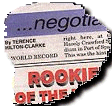

|
|
 |
![]()
Trinidad and Tobago Olympic Committee
By
TERENCE HILTON-CLARKE
(c)copyright
Part4
![]()
Thursday, June 25th 1998
THE LAST Olympic Games of the Twentieth Century were held in Atlanta in 1996 and Trinidad and Tobago's 13 athletes were among those who witnessed another exceptional opening ceremony created and choreographed by one of this country's top Carnival designers, Peter Minshall.
Ato Boldon was now the main member of the track contingent: a World Championship bronze medal in 1995, and a time of 9.92 seconds in winning the 100m title at the NCAA Championships in Eugene, Oregon, made him one of the favourites for the short sprint gold medal, along with world champion Donovan Bailey of Canada and Namibia's Frankie Fredericks.
Neil De Silva and Robert Guy also returned from 1992 and were joined by long jumper Wendell Williams, javelin thrower Kirt Thompson, long-distance runner Ronnie Holassie and female high jumper, Natasha Alleyne-Gibson.
After being written off after the Barcelona Games, Gene Samuel experienced another resurgence over the next few years and surprised everybody when he won the time trial crown at the 1994 Pan American Cycling Championships in Santiago, Chile. He later got a bronze medal at the Pan American Games in Mar Del Plata in 1995, and surpassed the qualifying standard for Atlanta.
Amateur boxer Kirt Sinnette had to cross two hurdles before he became Trinidad and Tobago's third ever fighter at the Olympic Games. After losing out in a qualifying tournament in San Juan, Puerto Rico, the light-middleweight was allowed to compete in another Pan Am tournament in Halifax, Canada - having achieved a sufficient standard in Puerto Rico. This time around, he made it to the final and earned his ticket to Georgia. Table tennis player, Dexter St Louis, also had to go through the rigours of a regional competition (in Havana, Cuba) before earning his berth.
Debra O' Connor's world ranking was the reason she was able to go to the Olympics, while female swimmers Siobhan Cropper and Cerian Gibbes had to make qualifying times before they could be allowed to join the contingent. O'Connor's Olympic adventure lasted just one game, as she lost 3-11, 0-11 to Canada's Denyse Julien in the opening around of the ladies badminton singles. Sinnette had everything going his way against Ethiopia's Yarod Wolde until a final round knockdown paved the way for the latter to triumph 11-10 on points. St Louis went out after failing to win a game in a first round group which comprised Sweden's Jorgen Persson, South Korean Kim Song-Hui and Brazil's Hugo Hoyama.There were also preliminary heat exits for Cropper in the women's 50 and 100m freestyle and Gibbes in the 100 and 200m breaststroke. At the Olympic Stadium (which has since been converted into the Turner Field baseball stadium), Boldon cruised through his heats easily enough. However, prior to the final he and others were forced to contend with the distracting antics of British sprinter Linford Christie. The 1992 gold medallist refused to leave the track area after being disqualified for a second false start. When the starter's gun did eventually go off without a second report, Boldon did have an early advantage. But, Donovan Bailey suddenly accelerated over the last 40 metres to cross the line in a world record time of 9.84.
Frankie Fredericks claimed the silver medal and Boldon, with his bronze effort in 9.90, was left with the consolation of capturing Trinidad and Tobago's first Olympic medal in 20 years. He would add a second bronze in the 200m after having to witness another world record performance from behind. This time, it was American Michael Johnson's 19.32 effort which vaulted him into history as the first man to complete the Olympic 200-400 double. Fredericks was once again second. De Silva reached the semi-finals of this event, just as he had done in the 400 to atone for the early elimination of Guy. Holassie was this country's first ever competitor in the men's marathon and he completed his historic run in a creditable 75th place. An embarrassing situation occurred when it was discovered by track officials that Wendell Williams' alleged qualifying jump in Germany had actually been wind aided and the athlete was refused entry into the long jump competition. The other two field athletes were unable to provide much of a consolation: Thompson placed 17th in the first round of the javelin; Alleyne-Gibson was also a first stage casualty in the women's high jump -- she recorded a best leap of 1.85m. As expected, Boldon was the most celebrated athlete on his return to Port of Spain, and the 22-year-old showed his gratitude by donating his medals to the display case at Royal Bank's branch at the corner of Park and Henry Streets.
| More
Sports with other sports articles divided in categories Articles
written for the
|




